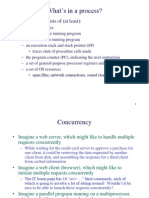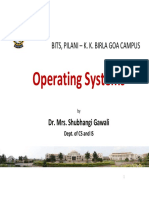0% found this document useful (0 votes)
28 views64 pages02 Parallel Processing - CPP and OMP
The document discusses the differences between multi-process and multi-thread programming, highlighting that processes do not share resources while threads within a process do. It covers thread concepts such as synchronization, communication, and issues like race conditions and deadlocks, as well as mutexes and atomic operations. Additionally, it introduces multi-threading in C++ and OpenMP, explaining their functionalities and programming models.
Uploaded by
Sergiu CusnirCopyright
© © All Rights Reserved
We take content rights seriously. If you suspect this is your content, claim it here.
Available Formats
Download as PDF, TXT or read online on Scribd
0% found this document useful (0 votes)
28 views64 pages02 Parallel Processing - CPP and OMP
The document discusses the differences between multi-process and multi-thread programming, highlighting that processes do not share resources while threads within a process do. It covers thread concepts such as synchronization, communication, and issues like race conditions and deadlocks, as well as mutexes and atomic operations. Additionally, it introduces multi-threading in C++ and OpenMP, explaining their functionalities and programming models.
Uploaded by
Sergiu CusnirCopyright
© © All Rights Reserved
We take content rights seriously. If you suspect this is your content, claim it here.
Available Formats
Download as PDF, TXT or read online on Scribd
/ 64





















































































































